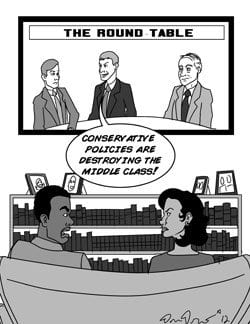
A reversal of fortune
Politicians have been decrying the loss of the American middle class. This crisis has developed just as many blacks have moved up to that income level for the first time. Even frugal families have noted a decline in their net worth. The recent release of the Federal Reserve’s Survey of Consumer Finances has established the definitive data on the family in 2010.
The median family net worth had declined to $77,300 in 2010, substantially less than the level of $126,400 in 2007. During the same period, median family income fell from $49,600 to $45,800. It was projected that three-fourths of the loss in net worth resulted from the housing price crash.
According to the report, families responded to the economic crisis by reducing their number of credit cards and the amount of credit card debt. The percentage of families with credit card debt declined by 6.7 percent to 39.4 percent, and median balances dropped 16.1 percent to $2,600.
However, one form of debt for middle-income families that has continued to grow is education. Those debts rose from 15.2 percent in 2007 to 19.2 percent in 2010 and are becoming a larger part of the obligations of middle-income families.
During the recession, the median family income of those in the bottom 20 percent income distribution actually increased because of government programs. Indications are that even some of the wealthiest families lost income during the period of the three-year report.
The Federal Reserve report concluded that the recession has severely damaged the American middle class. It is important for African Americans to see that the financial impact has been general. Like many times in the past, blacks must find ways to recover financially and continue to pursue their dreams.
The fight for voting rights — it never ends
For most Americans progress is linear. Once an individual is launched on the path upward, successes come on schedule as long as you follow the rules. That has never been the path for African Americans. It seems that every success is followed by a sustained effort to undo it.
In his PBS program “Finding Your Roots,” Professor Henry Louis Gates illustrates this syndrome with the story of the family of Congressman John Lewis, whose great-great-grandparents were slaves and sharecroppers in Troy, Ala. After the 14th and 15th Amendments to the U.S. Constitution made them citizens and gave them the right to vote, Lewis’ forbears registered in 1867 to become the first blacks in the county to register.
That new freedom did not last for long. Throughout the South, black voters were removed from the rolls with Jim Crow defiance including poll taxes, literacy tests that would challenge college professors and terrorizing night riders that became violent when the other strategies did not work.
With his family once again disenfranchised, John Lewis joined the civil rights movement to change the laws of the Confederacy. He became a leader of the Student Nonviolent Coordinating Committee (SNCC), and then he became a legend on Bloody Sunday, Mar. 7, 1965 when he marched across the Edmund Pettus Bridge in Selma, Ala. Shortly thereafter, President Lyndon B. Johnson signed the Voting Rights Act. Lewis was then able to reclaim his family’s birthright.
The story does not end there. In states across the U.S., conservative Republicans are now trying to remove from voting lists those that might be inclined to vote Democrat. That includes young voters and minorities. Conservatives assert that these measures are necessary to prevent voter fraud — a mythical problem.
For minorities the challenge never ends.






